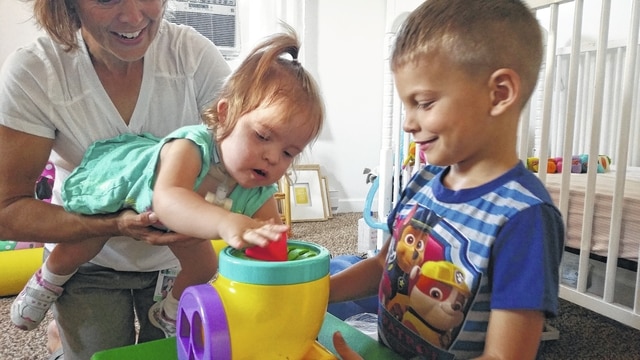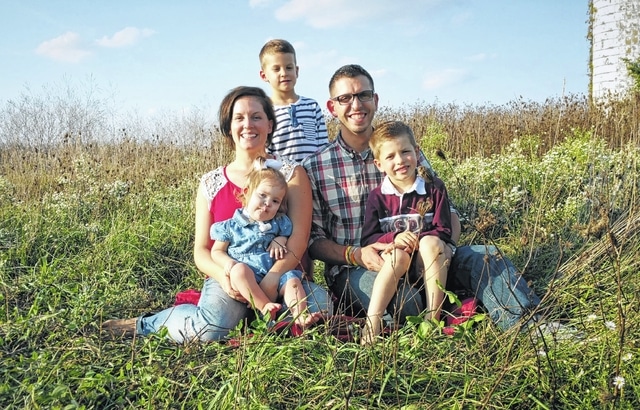

Editor’s note: Easy-going. Compassionate. Strong-willed. Adventurous. Helpful. Sensitive. One or more of these words may describe you. They also describe people with developmental disabilities. October is Community Awareness Month and the Shelby County Board of Developmental Disabilities encourages everyone to get to know someone with a disability and ask “What’s Your Story?” Each one of us has a story and each story has the potential to educate and inspire others. “We invite you to enjoy a series of articles highlighting several families involved in our program who would like to share their story with you. Their stories are powerful, meaning, and inspiring,” said Superintendent Laura Zureich.
SIDNEY — For Brandon and Jackie Ward, the knowledge that they would be the parents of a special needs child came when Jackie was pregnant with their daughter, Ellie, 2.
“We sat there in shock,” Jackie Ward recalled. “We didn’t know where to go.”
Ward said their nephew had attended Wee School (now known as early intervention) so the parents reached out to the Help Me Grow program.
“Ashley (Schindewolf) answered my frantic questions,” said Ward. “She was able to talk me through things and I learned how things would work to help my child at birth. She was able to provide resources to us as parents from day one.”
Ward said she in her 17th week of her pregnancy when they received the diagnosis their daughter would be born with Down Syndrome.
“For the first time since we received the diagnosis, someone reached out ad said ‘it was going to be OK.’ I could breath a sigh of relief knowing we were not alone,” said Ward. “We”ve got this. We had conversations and we knew it was going to be OK.”
After the Down Syndrome diagnosis, the family received more medical news about Ellie.
“A month later we found out she was going to be born with congenital heart defects,” said Ward.
Staff with the early intervention program visited the Ward home and gave them an evaluation and assessment of what type of schedule would be appropriate for Ellie.
“They told us what to do with the baby,” said Ward. “They should us how to hold her and how to support her head.”
When Ellie was two weeks old, she had heart failure and was back in the hospital.
“We kept in close contract with her therapist,” said Ward. “Her therapy program was very individualized with how she was doing. Even when she was in the hospital we reached out to her therapist. They all became part of her care team even when they didn’t have to.”
When Ellie came home from the hospital after her surgeries, the therapists were respectful of all the precautions needed to be taken because of her medical condition.
“They customized the plan to what she could do,” said Ward. “While Ellie was in the hospital, we stayed at the Ronald McDonald House. We were exposed to other children with Down Syndrome who had complications we didn’t even think of.”
Ellie’s therapists, said Ward, has helped the family overcome their fears and have worked together to see what Ellie can achieve.
“She has a tracheotomy tube, so we’ve never heard her laugh,” said Ward. “The speech therapists are helping with her speech. They have helped me though this process.”
Ward said the family marks each milestone in their daughter’s life.
“She’s making bitty steps of progress,” said Ward. “You work and work with her. It took a year for her to sit up. There’s a lot of emotional baggage that the team helps us through.”
The family is now watching and waiting for Ellie to take her first steps.
“She’s been pulling herself up to stand,” said Ward. “She scoots along the furniture and she’s so close to walking.
“We’re working on sounds and she’s eating pretty much everything,” she said. “After months in a hospital bed, she knocking our socks off.”
Ward said when the therapists come to the house, they bring one or two new things for Ellie and the family to try.
“They’ll sit her in her high chair differently,” said Ward. “They’ll encourage her to hold onto a stand and she’s learning to stack blocks. They are teaching us different ways to use things in our house to help with her therapy.
The physical therapist and occupational therapist visit the Ward home every week to work with Ellie.
“We are very spoiled by them,” said Ward. “It’s amazing that they come to our house especially during cold and flu season.”
The two therapists, she said, come separately and work with Ellie for 45 minutes to one hour each week.
“We’ll be capping her trach so her speech schedule will be increasing,” said Ward.
Ellie’s brothers, Lance and Kaleb, help with her therapy also.
“We try to incorporate them as much as possible in Ellie’s therapy,” said Ward. “They help with things that won’t be distracting her too much.”
The therapists, she said, also bring things for Ellie’s brothers to do so they don’t feel left out.
“They’ll bring card games or special things for them,” said Ward. “They want it to be fun for them while Ellie has her therapy.”
With so much behind them, the Ward family is looking toward a positive future for their daughter.
“I can’t wait to see her walk,” said Ward. “She’ll need a couple more surgeries to get rid of her trach. We’re hearing baby sounds coming from her. She standing and and will be walking soon.
“It’s hard to believe but at this time next year, she’ll be in preschool,” said Ward.
And while it’s a year away, the family is already talking about the transition to preschool.
“The early intervention staff and the preschool staff will work together for her to start preschool,” said Ward. “We’re bringing up concerns that we see in Ellie. She’ll hit her self and she doesn’t react. So she might be a sensory seeker. She also likes spicy food.
“We are taking all the pieces we’ve noticed over time and it’s like putting the pieces of a puzzle together,” she said.
It takes a team — from speech to physical therapy to occupational therapy — to reach the goals Ellie’s family hope she will achieve.
“It is so rewarding to work with families like the Wards,” said Alison Berning, who is Ellie’s speech therapist. “They are willing to go the extra mile to maximize Ellie’s abilities. From birth to age 36 months is a critical time in a child’s development and that is why Early Intervention is so important.”
“Ellie and her family are an inspiration to all of the staff that work with them,” said Molly Zimpfer, physical therapy assistant. “Ellie has overcome so many obstacles in her life and is a true “super hero.” I am blessed to work with the Ward family and I am amazed by their positive spirit, wonderful ideas, and devotion to helping others.”
“Ellie is a wonderful and joyful little girl, who has been an inspiration to all of us,” said occupational therapist Kendra Paulus. “The Ward Family are always willing to trial different techniques, ask questions, and ask for additional assistance. Jackie and Brandon are wonderful advocates for Ellie and others in the community to bring awareness to Down Syndrome.”
For the Ward family, the early intervention program at Shelby Hills has been their anchor through the first two years of Ellie’s life.
“On day one, we were terrified,” said Ward. “For Shelby Hills to continually support us is unbelievable. All the therapy goes so much farther than just doing an exercise. I’m so impressed with everyone we’ve worked with.
“Not every county gets the support like we do in Shelby County,” she said.



